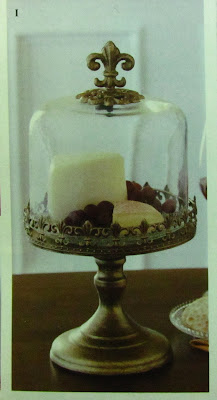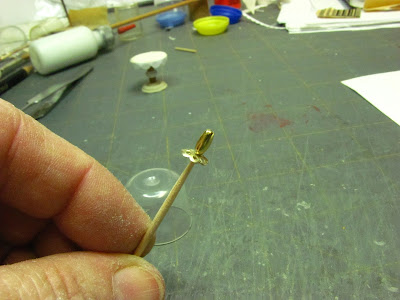This is a picture of a covered pedestal from a catalog that I thought would make a good blog tutorial.
For our "glass" cover I used tops from bottles of hair spray and a gumball machine toy container.
Find the right size circle for the plate part of the pedestal in your circle template.
In the next few pictures I will be showing how to make the pedestal from scratch. If you have a game piece or something else you can use for the pedestal go ahead.
Trace a circle for the plate onto mat board.
Trace 3 more circles for the pedestal onto mat board.
I also marked the quarters and drew lines so I could find the center of the circles later.
**This is were your creativity comes in. This is my version, I picked the sizes. When you make yours you decide what size circles and how many you want.**
I cut the circles out using scissors.
I have an extra circle in the mix, I decided not to use it.
Sand the edges of all the circles. I used 180 grit, use what you have on hand.
When you have the circles sanded glue them together, I used yellow carpenter's glue.
I am using an 1/8" dowel for the center post. 1/8" dowels are usually available from the lumber department at the big box stores.
Again, this is a choice you can make for the diameter of the center post.
I cut the center post 5/8" long.
I try to cut down on the fuzz I created when I sanded the edges by applying a coat or two of acrylic finish.
Let this dry.
Using a large pin, mark the center of the center post.
I am using the Dremel today for drilling holes.
To make the drilling easier you can use a small bit first and graduate up to the diameter of a tooth pick.
I have my hole drilled and I will dry fit the tooth pick before gluing.
I glued the tooth pick in with carpenter's wood glue.
Mark the center of the top circle with a large pin, I am using a "T" pin.
Drill a hole for the tooth pick to fit into.
Measure and cut the dowel 1/8" extra. This extra will be glued into the pedestal's foot.
Dry fit, you might have to sand the tip of the tooth pick a bit to help it fit into the hole.
Glue the tooth pick into the mat board.
I have just set the plate part onto the center post, it's not glued, yet.
I am estimating where I want to cut off the plastic top.
I've marked where I want to cut.
For brittle plastic I score a line with the craft knife and just keep scoring or scraping until I'm through the plastic.
I've gotten out my little collection of scissors that cut decorative edges. I even have a ancient pair of pinking shears.
I am going to use the scallop scissors.
I cut an edge with the scissors.
I measure 1/8" from the rounded top of the scallop and cut a strip.
I glued the edging onto the edge of the mat board plate.
I was lucky with this one, it went around and matched up!
You can also glue this strip pointing up. You are the designer, the choice is yours.
I am going to make a bead on the center post. I've shown this before when I made the bed from card stock.
I have my ruler laying diagonally at the paper's edge. I cut the strip. I am using the 8.5 end of a 8.5 x 11 sheet of paper.
You can try different lengths and widths for different shapes and sizes of beads.
I have glued the paper around the center post.
You can use tacky or carpenter's glue.
I don't like to butt glue anything together. The mat board plate is only 1/16" thick and really isn't worth drilling through.
With that said, butt glue the plate to the center post and let it dry completely.
These are bead caps. They are jewelry findings. You can usually find them in the beading department.
I am going to use the smallest bead cap for this top. I've also chosen an oblong gold bead.
Mark the center of the top with a large pin or "T" pin.
For connecting the bead and bead cap to the top I am going to sand down a tooth pick.
Yes, I could use a head pin, that's also from the beading department. I find I have more luck with the glue sticking to the wood rather that the metal of the head pin. The choice is up to you.
If you use the tooth pick you will have to sand down to the diameter of the holes in the bead cap and bead.
I am dry fitting my knob together.
You could also make a knob from punching out shapes and gluing them to a tooth pick as I have with this top.
I am marking where I want to cut off the extra tooth pick.
I've cut the extra off.
Dry fit your bit of tooth pick. You may need to drill out the hole in the top.
My knob is a little obscured by my background, isn't it?
Got it all together.
I've mixed some wood glue with my paint.
My rule of thumb is add glue, but don't add so much as to change the color of the paint.
I'm working with white . . . .
I used a tooth pick to drape the glue/paint mix onto the center post and down to the mat board, blending the two together.
I also did the same thing at the top to help that butt joint.
I also covered the bead's paper lines.
You might have to do this a couple of times depending how much glue you had in the paint.
Wait until this glue/paint mix dries before you paint the rest of the pedestal. If the glue/paint mix only has a "skin" on it you can damage it with your paint brush.
I've painted this pedestal white.
I am going to add some gold to the edges and maybe a band or two.
Here is the finished covered pedestal. Too bad I don't have a cake baked!!
I played with making a couple of more using the gumball machine containers.
I think they are a little large, they make a great statement, though. They would be good in a commercial setting like a bakery.
Have fun, Expand on it, Make it better . . . . .
Just keep making minis!!
Kris







































